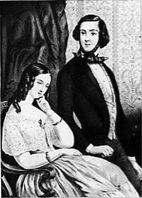




Familiarities Between Relations
From: Peterson’s Magazine 1860
"A fair correspondent asks us if we do not think it ill-bred for gentlemen to kiss their female cousins, or other relations, on the plea of consanguinity. She says that she was present on a late occasion, when the subject was discussed, and that her objections to such familiarities were pronounced prudish by more than one of the company."
"We should certainly, if we were a lady, take the side of our fair correspondent, even at the risk of being called prudish also. We have so often seen wives secretly pained by these so-called innocent familiarities, on the part of their husbands toward young ladies, that we do not hesitate to say that no man of refined feelings will ever be guilty of such romping again, if he once seriously thinks about the subject. How would he like, for instance, to see his wife kissing all the handsome young men that came to the house, and then defending the act by saying that cousinship, or a close intimacy, warranted the freedom?"

"We know a very estimable gentleman, a pattern father and husband, an eminently useful member of society, who invariably makes all young ladies visiting at his house, kiss him morning and evening. Now, if he was thirty years older, with a silver head of hair, this, perhaps, might be well enough. But, though he means no harm by it, and pretends it is only a fatherly custom, the young gentlemen, who are admirers of his fair guests, never see him take these familiarities without wincing? Is it right for him-- putting everything else aside-- to hurt the feelings of a lover in this way? We are sure he never thought of the subject in this light, or he is too good-hearted to have persisted in this practice. Nor do his fair guests altogether like his conduct. But what can they do? It seems so small a matter, this being kissed by the father of their schoolmate, that they dare not take offense at it. Half of their own sex, they know, would call them silly, if they resented it. So they submit, and their example makes others submit, and so it goes on to the end of the chapter."
"Whatever thus hurts the feelings of a wife, or secretly angers a lover, or annoys a young lady, cannot be well-bred. Everywhere, in the United States-- and very properly-- kissing is regarded as more or less sacred. No man likes to see another man kiss his wife, unless that man be her father. A husband, or even lover, has the same objection to beholding another man put his arm around the waist of his wife, or his betrothed, unless in the waltz; and many husbands and lovers, in spite of fashion, dislike this also, and we think dislike it very properly. Why should not a woman be hurt at such familiarities, bestowed, by her husband or lover on another woman? Is the female heart less sensitive than a man's? Real politeness, if we know what it is, seeks to spare other's feelings. How can there be any doubt, therefore, that such familiarities are ill-bred?"

"The rule would be different in countries like Russia, where kissing is as common as hand-shakings is with us. Our English ancestors, in Henry the Eighth's time, kissed on meeting and parting, however slight the acquaintance. But, in modern time, and in this country, kissing between sexes has become a proof of special endearment, rather than a mode of ordinary salutation; and being as such, it is, strictly speaking, not proper except between husband and wife, brother and sister, father and daughter, lover and betrothed. We give the same verdict as to all similar familiarities. To refuse them is neither prudish nor ill-bred, even if you are a guest; and no real gentleman will contradict us, after he has seriously thought about the matter."

